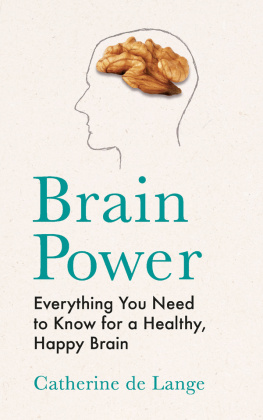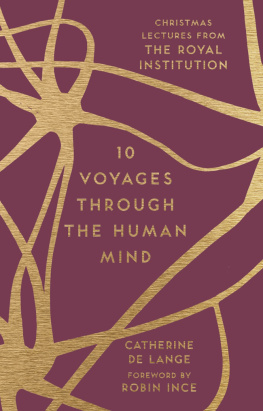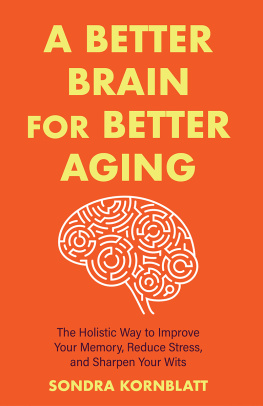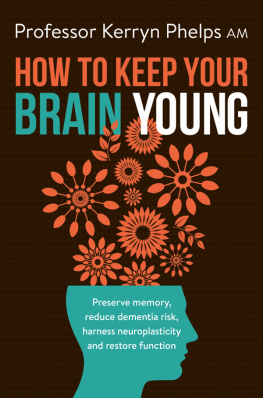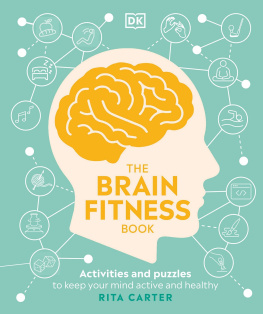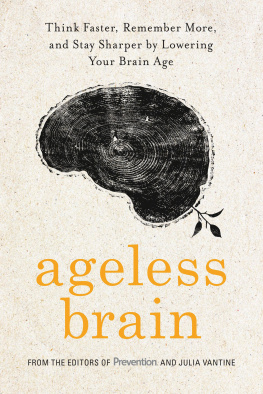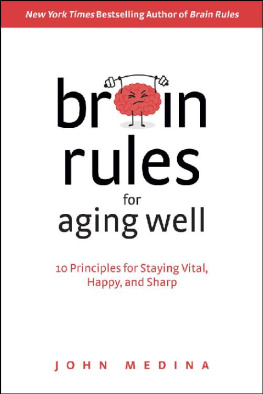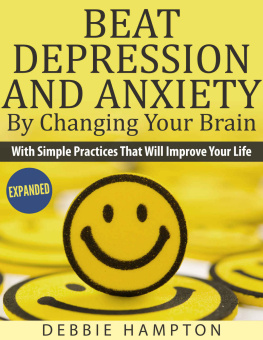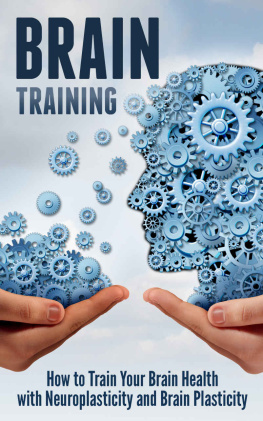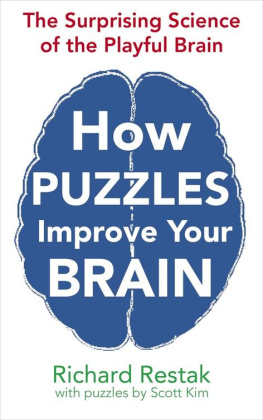Brain Power
Also by Catherine de Lange
10 Voyages Through the Human Mind

For Alok
First published in Great Britain in 2022 by
Michael OMara Books Limited
9 Lion Yard
Tremadoc Road
London SW4 7NQ
Copyright Catherine de Lange 2022
All rights reserved. You may not copy, store, distribute, transmit, reproduce or otherwise make available this publication (or any part of it) in any form, or by any means (electronic, digital, optical, mechanical, photocopying, recording or otherwise), without the prior written permission of the publisher. Any person who does any unauthorized act in relation to this publication may be liable to criminal prosecution and civil claims for damages.
A CIP catalogue record for this book is available from the British Library.
ISBN: 978-1-78929-338-8 in hardback print format
ISBN: 978-1-78929-345-6 in ebook format
www.mombooks.com
Contents
Just as I was coming to the end of writing this book, I happened to have my first ever appointment with a neurologist. The debilitating migraines that used to afflict me every now and again had become a regular occurrence, and I wanted to get to the bottom of it. Sitting behind an imposing desk, the neurologist asked me various questions about my lifestyle, my family history and my headaches. When I admitted I couldnt put my finger on what specifically triggers the migraines, he told me not to worry: even he a neurologist with special training in migraine and headaches couldnt tell me what causes his own.
By the end of our consultation, reassured that it was probably nothing too sinister, the doctor took out a piece of paper and scribbled down the name of something I could take that had been proven in trials to help some people with migraines. It wasnt a fancy new drug or a strong painkiller instead, his note read: Vitamin B2 (Riboflavin) 400 mg.
Vitamin B2 is found in foods like almonds, broccoli and eggs, of which I eat plenty, and has many known uses in the body including helping turn food into energy, and proper functioning of the nervous system. We only need a fraction each day of the 400 mg my neurologist prescribed but several trials have shown that people taking large quantities of the vitamin had fewer migraines and that they became shorter in duration. One study even found it cut the number of migraines in half. As a science journalist, the first thing I did was look up those studies and assess the evidence for myself. Im still a little sceptical but seeing as there are no side effects (except my urine turning luminous yellow), Im willing to give it a go. As well as making me feel a little better about my migraines, my neurology appointment also highlighted a lot of important things about the brain I have discovered while writing this book information useful to us all.
Lets start with the fact that my doctor one of the top headache specialists around was actually somewhat in the dark about what causes many headaches. It would be clichd of me to tell you that the human brain is the most complex object in the known universe, but the fact is it is truly, unbelievably complex, and despite decades of research we are only just starting to scratch the surface of how it works. We dont yet know all the cells that make up the brain, let alone how they communicate with each other to create our complex thoughts, emotions, behaviours, sensations, and best of all our sense of consciousness. So Ill forgive my neurologist for not knowing all the details.
You might take from this that we should simply give up. The brain is too complicated for us to make sense of but thats not right either. We are constantly discovering new information about the workings of the brain, especially with the help of technologies like MRI scans, which allow us to see the brain in action. These are incredibly exciting times in neuroscience, and we can put this new knowledge to good use. However, we just need to remember that science is an ongoing process. In some areas that I cover in this book, especially the powerful influence of exercise, sleep, keeping mentally engaged and having strong social connections, the jury is in there are definite ways to boost our brain power through our actions. In others, the evidence is less clear cut. But these developing areas of our understanding are fascinating, and certainly worth being aware of as research progresses.
Now lets turn to those B vitamins and this is where things get exciting. There is today a growing appreciation that the brain leaving no doubt that what we choose to do in our daily lives is crucial to our brain health.
This way of thinking is revolutionary because it points to the myriad ways that keeping the body in good health, as well as other hobbies and habits, will also keep our minds firing on all cylinders, and it is these that we discuss in this book.
It also means that we shouldnt wait until things go wrong until we are sitting in front of that neurologists desk to look after our brain health. If anything, this book is a manifesto to take control of your brain health now. And the sooner you start the better.
This revolution couldnt come soon enough. By 2030, the number of people aged sixty years or over is predicted to grow by 56 per cent to 1.4 billion. Unfortunately, we also still have a sketchy understanding of the causes of Alzheimers, and treatments have not been forthcoming. That means lifestyle factors that can prevent and slow this disease are more vital than ever.
Throughout this book we talk about things we can do and things we can avoid to improve our brain health. But what does it even mean to have a healthy, happy brain? Within these pages, Ive taken a healthy brain to mean a brain that is functioning as expected, based on measures such as the structure of the brain, and how well it works when examined in a brain scanner. Well also talk a lot about how the brain changes with age, and what we can do to keep any detrimental changes, those that tip us towards dementia in particular, to a minimum. As for a happy brain, what we are really talking about here is mood. That encompasses mental-health conditions that affect our mood such as depression and anxiety, as well as other states that can make us feel bad, like stress. Well also be looking at ways we can all give our mood an instant boost unrelated to any mood disorders. Within both of these categories, well also be talking about cognitive performance in other words, how to keep our brains sharp, whether thats an immediate burst of attention, focus or creativity, or keeping our wits about us in the long term.
It is worth noting that while this book focuses on the brain almost exclusively, many of the things covered here can be hugely beneficial to the body, too. Even better, many of them are also free, often dont take much time, and can be a lot of fun. So embarking on a journey to improve your brain health will probably improve your life in all sorts of other ways too.

Ultimately, a healthy brain is about feeling good. My hope is that this book will help you identify changes big or small that you might want to implement in your life, both now and as you age, that do not feel like a chore or a punishment. I would encourage you to try things out and see if they work for you, but if they feel onerous, give them a miss and opt for something else.

